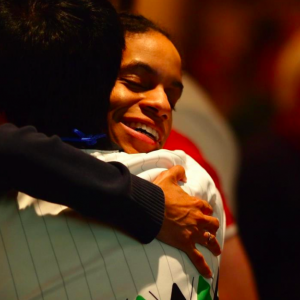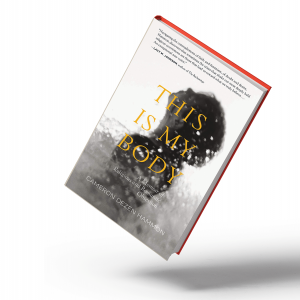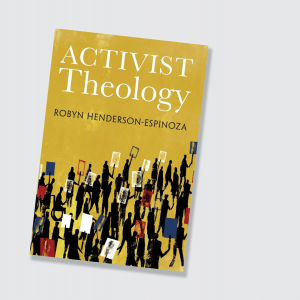
Jera Brown writes about the intersection of their faith and sexuality at scarletchurch.com and edits the blog and anthology project sacredandsubversive.net.
Posts By This Author
How One Woman's Affair Led to a Reckoning With God
IS THERE A difference between being committed to one’s faith and being obsessed with it? This question is indirectly posed in Cameron Dezen Hammon’s debut book, This is My Body: A Memoir of Religious and Romantic Obsession, which connects the hope, despair, and desire that someone can feel about a love interest or God.
The memoir spans about 15 years of Hammon’s life and describes her relatable parenting, money, work, and marriage hardships. Equally relatable is her struggle with the approaches to these issues presented by a series of Houston megachurches for which she and her husband act as music ministers. These churches preach a hierarchical (as well as homophobic and misogynistic) version of Christianity in which obedience to God will lead to success and happy marriages. An inclusive feminist, Hammon doesn’t wholeheartedly subscribe to this doctrine, but neither does she know how to find meaning outside of it.
About her marriage, she writes, “I believe, or think I’m supposed to believe, that God will fix this. Fix us. Fix my loneliness, meet my needs. Or if God is not meeting my needs, then the fault lies with me.”
Drawing Power from a Disruptive Love
HISTORICALLY, THEOLOGY HAS worked a lot like Reaganomics. Those with access to academic ivory towers get to theorize about God and spiritual meaning. Often, watered-down versions of these theories reach the rest of the population through pastoral care professionals and the few thinkers and writers who strive to make theology accessible.
One of the primary goals of activist theology, described by theologian Robyn Henderson-Espinoza in their new book Activist Theology, is to reverse this flow of meaning-making. The work of activist theology “is to invest in community, so that knowledge production is not top down from the academy but begins on the ground to move to the middle and tip the top.”
What does it mean to “tip the top?” Ideally, a revolution.
This starts with recognition of how social and political systems of oppression are supported by what the author calls “theologies of white supremacy” and Christian supremacy. There is a long history of theological systems that have exposed these issues, such as queer, womanist, mujerista, and liberation and black liberation theologies.
Beyond the Purity Culture Wars
Many grew up being told over and over that their virginity was the most important thing they could give their spouse on their wedding night, only to reach that point and realize that having saved themselves didn’t magically create sexual compatibility or solve their marital issues. Many soon divorced. Still others sat silently in their church groups, wondering what virginity could possibly mean for them as people who had been victims of incest or abuse or who felt attracted to the same gender.
After Bomb Threats Against Jewish Centers, Chicago Faith Groups Show Up for Neighbors

Image via lobstar28/Flickr
In the wake of these threats, faith groups in Chicago have grown more intentional about coming together in solidarity — something many Jewish and Christian leaders alike credit to their religious teachings and their understanding of what it means to care for one's neighbor.
Can Christian LGBTQ Communities Embrace Intersectionality?

Image via Gay Christian Network/Facebook
At GCNC in 2016, Rev. Broderick Greer spoke to this problem in his keynote address, “Theology as Survival.” In it, he said, “I survived — and am surviving — the strain of being subject to white heterosexist patriarchal theology.”
After the death of Michael Brown, Greer became active on Twitter using the #blacklivesmatter hashtag, and found “stories of black and brown people oppressed, silenced, and erased by white church leaders, pastors, and theologians — or theobrogians, as some of them are affectionately called. And the stories were like mine: incomplete, sore, familiar, frustrated,” he said.


